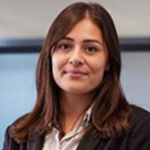I first studied Biology at the University of York, taking modules in cell biology and genetics. I then pursued a Master’s in Molecular Medicine at Imperial College London, where I completed research in epigenetics. After I graduated in 2020, I worked in research before starting as a Technical Assistant at Brand Murray Fuller in November 2021.
Why did you choose a job in this profession?
I have always been interested in the practical and transferable applications of science. For me, patent law offered a unique opportunity to pursue this interest as you are continually exposed to innovative, cutting-edge technology. I was also excited about the unique combination of science, law and business that a career as a patent attorney provides, and the opportunity to develop my knowledge of all three aspects on the job. The profession also provides variety – no two days are the same, so you will never get bored!
What are your main duties/roles?
As a trainee, I work under the supervision of partners and senior associates largely on patent prosecution, but I have also worked on freedom to operate opinions and oppositions. Typical tasks include writing to patent examiners to respond to objections they may raise, writing to clients to provide advice, and instructing foreign attorneys on how to proceed on behalf of your clients.
There is a steep learning curve, but work is done with both guidance and feedback and so you are always well supported. Additionally, working with a variety of senior colleagues exposes you to different stylistic approaches, which is particularly beneficial as a trainee.
Is it a 9-5 job?
Generally, yes. Whilst it is highly deadline driven, these deadlines generally tend to be given far in advance and can therefore be met with good time management. Additionally, at Brand Murray Fuller, we have the option to work from home up to twice a week, which is encouraged to maintain a good work/life balance.
However, to qualify, there are a number of exams you will be required to sit. At Brand Murray Fuller, trainees first sit the Certificate in Intellectual Property held by Queen Mary University of London. During this course, one day per week is spent in the office and the remaining days are spent studying. Later exams (both UK and European) are then typically prepared for outside of work hours, although the firm provides seminars and other revision support.
Do you have any advice for anyone wanting to enter the profession?
I recommend researching firms that you would be interested in working for and tailoring your application accordingly. Whilst it can be tempting to apply to as many firms as possible, it is important to end up at a firm that is the right fit for you. This applies to the subject-matter you will be working with, but also to the firm’s approach to training. For example, at Brand Murray Fuller, trainees attend client meetings and hearings, and are given responsibility from the get-go, which provides an interesting and enjoyable challenge.
I also recommend speaking to people in the profession to understand more about a career in IP. Some firms also offer open days and internships, which can be useful but are by no means necessary.







